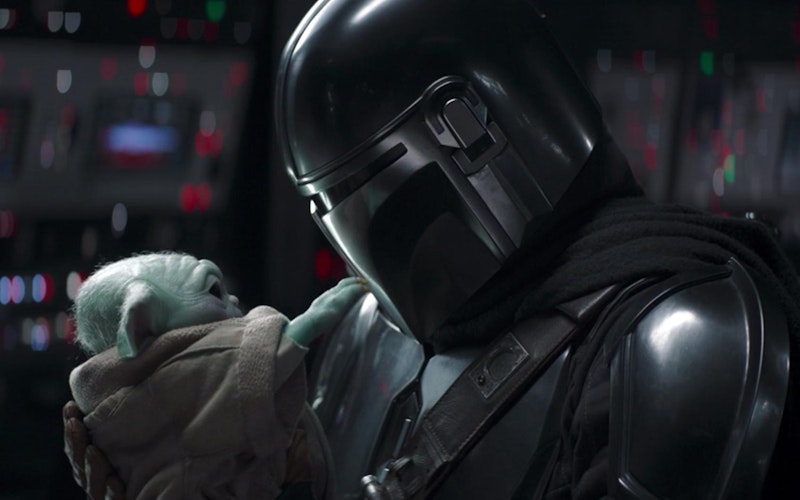
TV
The Merciful Way of The Mandalorian
Star Wars is no stranger to religious overtones, so when Season 2 of The Mandalorian cemented Mandalorians as a religious group, it fit well into the larger universe. Throughout the season, Din Djarin, the Mandalorian of the title, navigates the religious tension between love and a righteous life. His path illustrates the way Jesus marks for Christians as well.
The first season of The Mandalorian firmly established a single rule for Din Djarin (Pedro Pascal), who is also known as Mando: no other living creature may see his face. We only saw Pascal's grizzled visage at the end of Season 1 because Mando decided a droid didn't count, so he allowed one to remove his helmet and save his life. That's right—Mando contemplated dying rather than betraying the mandate of, as the series calls it, “the Way.”
Djarin's religiosity comes into even starker focus in the third episode of Season 2, when he encounters another group of Mandalorians led by Bo-Katan (Katee Sackhoff). At his indignation when they remove their helmets, Bo-Katan scoffs, naming Djarin as a member of a “cult of religious zealots that broke away from Mandalorian society.”
While this is news to Djarin, it should be achingly familiar to religious folks. We find twin impulses running through Scripture, impulses that are both deeply religious, both grounded in a desire to please God. We might call them the impulse to mercy and the impulse to righteousness.
Mercy grows out of love oriented towards others. It's a desire to include, to welcome outsiders, to share with those who don't deserve. Mercy looks like grace. Righteousness grows out of love oriented toward God. It's a desire to honor God, to live as God in the world, and to show others the way of God. Righteousness looks like judgment—careful discernment and commitment to God's way.
In good times, these two impulses work hand in hand. There's more than enough to go around, so mercy is easy. People are generally kind, helpful, and good. And so Djarin can keep his helmet on and fulfill his mission—to protect little Grogu, referred to by Djarin as “the Child.” Jesus emphasized the compatibility of these impulses when he identified the greatest commandment, pairing a love for the Lord with a love for neighbor.
Unfortunately, good times don't last. Cultures change. Pandemics cover the globe. Empires rise. Moffs kidnap Yoditos. In bad times, righteous judgment grounded in love of God too easily gives way to a judgmentalism grounded in fear of the larger world. This fear is the root of religious fundamentalism.
The Mandalorian firmly established a single rule for its title character: no other living creature may see his face.
In Jesus' day, Pharisees often embodied this sort of fundamentalism. The Pharisees first emerged in the time of the Maccabees, with noble intentions; in a society where few remembered the old ways, this group of scribes and teachers committed to embody God's way not just in the Temple, but in everyday life. In a world that had forgotten holiness, they would be holy. By Jesus' day, however, many Pharisees had turned inward, allowing their concern with righteousness to become merciless.
This came to a head when Jesus called Matthew to become his disciple. In response to Jesus' generosity, Matthew hosted a banquet with Jesus as the guest of honor. When some Pharisees cited Jesus' attendance as evidence that he was not faithful to God's way, Jesus quoted the prophet Hosea in response: “Go and learn what this means: ‘I desire mercy, not sacrifice.’”
In other words, Jesus insists that mercy trumps judgment. When our impulse to mercy and our impulse to righteousness conflict, choosing mercy is how we remain righteous.
In the penultimate episode of Season 2, Din Djarin comes to a moment of choice (spoilers ahead). The only way he can gain the information he needs to rescue Grogu from Moff Gideon (Giancarlo Esposito) is by removing his helmet in the middle of an Imperial stronghold. Unlike the exception he made in Season 1, this time a whole room of Imperial soldiers will be privy to his unmasked visage.
Two impulses war within Djarin in that moment: his pledge to never show his face and his duty to protect and care for the orphan Grogu. Both are religious obligations; both arise from his commitment to his religious order. And in this moment, he cannot fulfill both. He must either remain masked or save Grogu. So Djarin does what would have been unthinkable only a season ago: he removes his helmet and strides into the room, unmasked.
Thanks to Pascal's masterful acting, we feel Djarin’s anguish (we may only see his face for a few moments, but Pascal makes each of them count). We have no doubt in this scene what the righteous action is: there is no galaxy near or far, far away in which we would praise Djarin for adhering to the laws of his order rather than saving an innocent, vulnerable life. We understand intuitively that the righteous action is to choose people over policies. Real faithfulness in this case involves choosing mercy over judgment.
We're unsurprised then—but deeply moved—when Djarin must say goodbye to Grogu in the finale and does so by removing his helmet, so he and Grogu might share a moment both intimate and heartbreaking. It's easy to imagine other fundamentalist Mandalorians standing to the side, clucking about how Djarin has left the Way. But as Djarin gazes on his adopted child for the last time (at least for now, we all hope), it is clear that he embodies the very best of Mandalore: defending the vulnerable and protecting the orphan. (Indeed, it's hard not to see echoes of James' definition of religion that is “pure and faultless”).
Din Djarin is not a heretic. He is not backsliding. By choosing mercy over judgment, he shows he is the Mandalorian. By choosing love, he shows this is the Way.
Topics: TV